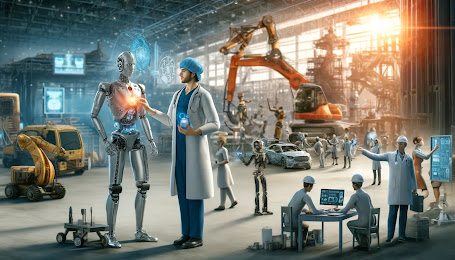Will Robots and Artificial Intelligence Handle Every Task in the Future?
In recent years, the rapid advancements in technology have left many wondering: will robots and artificial intelligence (AI) take over all human tasks in the future? This intriguing question sparks a wide range of emotions, from excitement about new possibilities to concerns about job displacement and societal changes. Let’s explore how AI and robotics are transforming the way we work and live, and what the future might hold.
The Current Role of Robots and AI
Today, AI and robots are already playing a significant role in various industries. From manufacturing and healthcare to customer service and entertainment, these technologies are improving efficiency and reducing costs. Here are a few examples:
- Manufacturing: Robots assemble cars, package products, and perform quality control at speeds unmatched by humans.
- Healthcare: AI assists in diagnosing diseases, analyzing medical images, and even performing surgeries with precision.
- Customer Service: Chatbots and virtual assistants provide 24/7 support, handling routine inquiries and freeing up human agents for complex issues.
The Benefits of AI and Robotics
The increasing use of AI and robots comes with numerous advantages:
- Efficiency and Productivity: Machines can work tirelessly without breaks, leading to higher productivity.
- Precision and Accuracy: AI systems minimize human errors, especially in critical fields like healthcare and finance.
- Cost Reduction: Automation lowers labour costs, making products and services more affordable.
Challenges and Concerns
Despite these benefits, the rise of AI and robots also raises some concerns:
- Job Displacement: As machines take over repetitive and manual tasks, many fear losing their jobs. However, history shows that technological advances often create new opportunities.
- Ethical Dilemmas: How should AI systems make decisions, especially in morally complex situations?
- Security Risks: With increased reliance on AI, the risk of cyberattacks and data breaches also grows.
Will AI Take Over Every Task?
While AI and robots are becoming increasingly capable, there are still many tasks that require human intuition, creativity, and emotional intelligence. Here are some areas where humans may remain irreplaceable:
- Creative Fields: Art, literature, and music rely heavily on human imagination and unique perspectives.
- Social and Emotional Roles: Jobs like counselling, teaching, and caregiving require empathy and personal interaction.
- Strategic Thinking: Complex decision-making and leadership involve understanding human dynamics and long-term vision.
Moreover, AI is only as good as the data it is trained on, and it cannot understand context or make moral judgments in the way humans do.
A Collaborative Future
Instead of fully replacing humans, AI and robots are more likely to work alongside us, enhancing our abilities and taking on tasks that are dangerous or tedious. This collaboration could lead to a more efficient and innovative society, allowing people to focus on more meaningful and creative pursuits.
Conclusion
The future of work is undoubtedly evolving with the rise of AI and robotics. While it’s unlikely that every task will be automated, these technologies will continue to reshape industries and redefine human roles. By embracing these changes and preparing for the challenges ahead, we can harness the power of AI to create a better, more efficient world.





2 Comments
Instead of fully replacing seo optimizer human, AI and ropbots are more likely to work alongside us.
ReplyDeleteYes it is my honor you seo optimized for my website
Delete